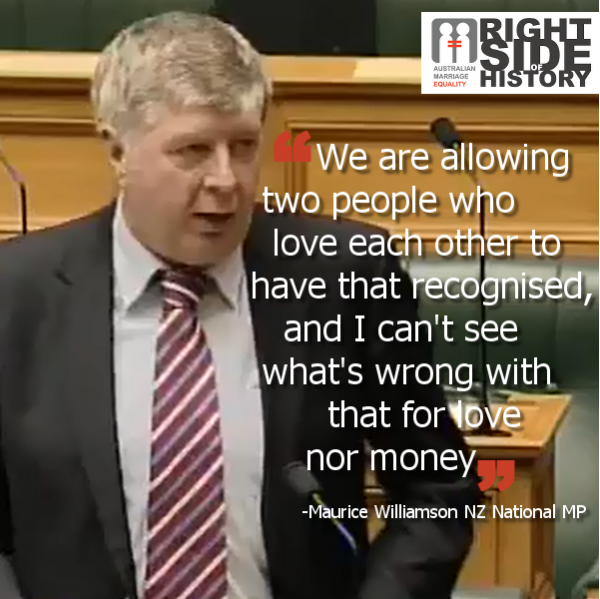
The Kiwis have bucked tradition and changed their definition of marriage so that all couples can wed. Here’s how the vote across the Tasman for marriage equality unfolded
Once again, the Kiwis have made us look bad. Last night New Zealand Parliament passed laws making marriage a contract between two people — not a man and a woman. Gay, lesbian and transgender couples can now tie the knot legally. There’s no residency requirements to marriage laws so Australian couples with the means and inclination can cross the Tasman to wed if they wish. The law will come into force in four months – which means the wedding season will start in late August.
The public gallery in the parliament was full to overflowing and cheers broke out when the results were announced. Conrad Reyners, the convenor of the Campaign for Marriage Equality said, “Tonight’s vote is a symbol of hope. It sent the message that our lives have equal value. This bill will not end discrimination overnight, but it sends a powerful message of self-worth and acceptance.”
The Kiwi bill was championed by MP Louisa Wall, supported by a cross-party working group who helped build support for the reform. Gordon Campbell at Scoop.co.nz hailed the cross-party efforts to build numbers for the bill as worth applauding and called for more bipartisan cooperation down the track.
Wall’s speech on the final reading of the bill is worth citing.
“Marriage laws have continually been used as a tool of oppression. The Nuremberg Laws in 1935 prohibited marriage between German nationals and Jews.
“The South African Immorality Act and the Prohibition of Mixed Marriage Act prohibited marriage and sexual contact between races until it was repealed in 1985. 40 US states prohibited interracial marriage. Women lost all property rights and their identity on marriage.
“Excluding a group in society from marriage is oppressive and unacceptable. There’s no justification for the prohibitions of the past based on religion, race or gender. Today we’re embarrassed and appalled by these examples.”
Te Ururoa Flavell of the Maori Party also talked about the traditions of marriage that might better be left behind.
“This is not the first time that Māori have encountered controversy around the concept of marriage. In 1888 the Supreme Court of New Zealand made a decision that has been described as ‘doubtful legally and deplorable socially’. That doubtful and deplorable decision was to reject the customary marriages that had existed mai rānō, and to assume that the marriage law of England took precedence.
“In fact, the colonial law from another land was considered of such importance that the children of Māori customary marriages were then described as “illegitimate”, yet so significant was the status of customary marriages amongst our people that they continued to be recognised for the purposes of succession to Māori land until 1951.
“So when opponents of this bill criticise a change to the definition of marriage as contravening our sacred traditions, I would have to say ‘Whose traditions are we talking about?’.”
NZ Prime Minister John Key isn’t necessarily known for being a progressive flagbearer — he delivered the John Howard Lecture at the Menzies Centre last year — but he has taken a commonsense approach to marriage equality: “My view has been that if two gay people want to get married then I can’t see why it would undermine my marriage.”
The speech of National MP Maurice Williamson got plenty of international media coverage as well, including plaudits in Gawker. Like Key, his approach to the change was pretty calm. “The world will just carry on,” he said.
“All we are doing with this bill is allowing two people who love each other to have that love recognised by way of marriage.”
“That is all we are doing. We are not declaring nuclear war on a foreign state. We are not bringing a virus in that could wipe out our agricultural sector forever. We are allowing two people who love each other to have that recognised, and I can’t see what’s wrong with that for love nor money.”
For campaigners who have long been fighting for equal rights, the marriage equality win is the “treasure at the end of the rainbow”, according to Russell Brown, columnist for NZ site Public Address. He reflected on the violence and exclusion suffered by gay and lesbian people in New Zealand. “For some of us, the comfortable passage of Louisa Wall’s bill completes an arc that began with the torrid, sometimes terrible days leading up to homosexual law reform in 1986.”
Conrad Reyners said the vote “will forever be remembered as a moment when New Zealand affirmed fairness, equal treatment, and love for all.” Some Australian gay and lesbian couples may make the trip across the Tasman to get hitched, as Australian Marriage Equality spokesperson Rodney Croome predicts – but many more will not.
The Marriage (Definition of Marriage) Amendment Bill passed by a 77-44 vote – 64 per cent of NZ parliamentarians who voted in favour of the bill. Interestingly, that’s pretty close to the proportion of Australians who are in favour of same-sex marriage. When, in September 2012, Australian MPs had the chance to vote on a same sex marriage bill, they voted against it. We wrote at the time:
“As many have pointed out, the proportion of MPs who voted against the bill — 65 per cent — is roughly equivalent to the level of support for gay marriage in Australia.”
Today, the Sydney Morning Herald reports that the PM is “unmoved” by the NZ vote. Tony Abbott hasn’t changed his views and won’t allow a conscience vote on the issue if he becomes PM. “Fairness, equal treatment, and love for all” still remains a distant prospect.
Author: New Matilda
Publication: New Matilda
Publication Date: April 18 2013
